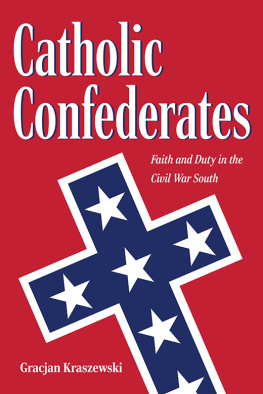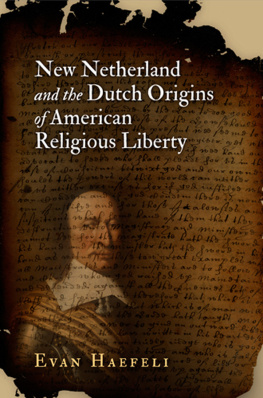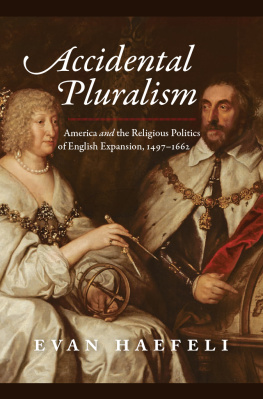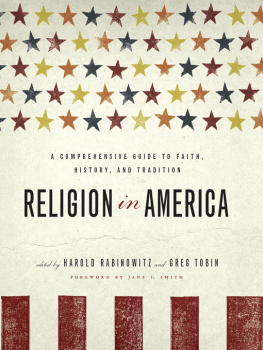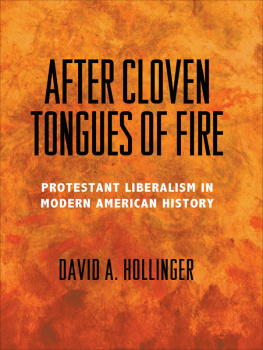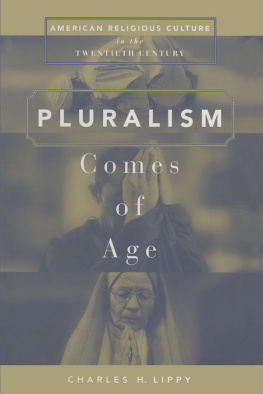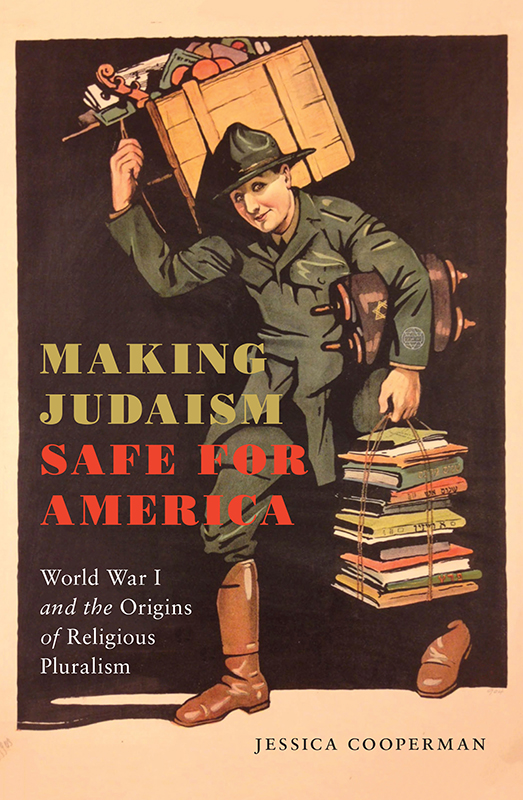
Making Judaism Safe for America
THE GOLDSTEIN-GOREN SERIES IN AMERICAN JEWISH HISTORY
General editor: Hasia R. Diner
We Remember with Reverence and Love: American Jews and the Myth of Silence after the Holocaust, 19451962
Hasia R. Diner
Is Diss a System? A Milt Gross Comic Reader
Edited by Ari Y. Kelman
All Together Different: Yiddish Socialists, Garment Workers, and the Labor Roots of Multiculturalism
Daniel Katz
Jews and Booze: Becoming American in the Age of Prohibition
Marni Davis
Jewish Radicals: A Documentary History
Edited by Tony Michels
1929: Mapping the Jewish World
Edited by Hasia R. Diner and Gennady Estraikh
An Unusual Relationship: Evangelical Christians and Jews
Yaakov Ariel
Unclean Lips: Obscenity, Jews, and American Culture
Josh Lambert
Hanukkah in America: A History
Dianne Ashton
The Rag Race: How Jews Sewed Their Way to Success in America and the British Empire
Adam D. Mendelsohn
Hollywoods Spies: The Undercover Surveillance of Nazis in Los Angeles
Laura B. Rosenzweig
Cotton Capitalists: American Jewish Entrepreneurship in the Reconstruction Era
Michael R. Cohen
Jewish Radical Feminism: Voices from the Womens Liberation Movement
Joyce Antler
Making Judaism Safe for America: World War I and the Origins of Religious Pluralism
Jessica Cooperman
Making Judaism Safe for America
World War I and the Origins of Religious Pluralism
Jessica Cooperman

NEW YORK UNIVERSITY PRESS
New York
NEW YORK UNIVERSITY PRESS
New York
www.nyupress.org
2018 by New York University
All rights reserved
References to Internet websites (URLs) were accurate at the time of writing. Neither the author nor New York University Press is responsible for URLs that may have expired or changed since the manuscript was prepared.
Library of Congress Cataloging-in-Publication Data
Names: Cooperman, Jessica, author.
Title: Making Judaism safe for America : World War I and the origins of religious pluralism / Jessica Cooperman.
Description: New York : New York University Press, [2018] | Series: The Goldstein-Goren series in American Jewish history | Includes bibliographical references and index.
Identifiers: LCCN 2017060986 | ISBN 9781479885008 (cl : alk. paper)
Subjects: LCSH: World War, 19141918Jews. | Jewish Welfare Board. | Jewish soldiersUnited StatesHistory20th century. | JewsCultural assimilationUnited States. | United States. Commission on Training Camp Activities. | World War, 19141918Social aspectsUnited States. | Americanization. | United StatesEthnic relations.
Classification: LCC D639.J4 C56 2018 | DDC 940.3089/924dc23
LC record available at https://lccn.loc.gov/2017060986
New York University Press books are printed on acid-free paper, and their binding materials are chosen for strength and durability. We strive to use environmentally responsible suppliers and materials to the greatest extent possible in publishing our books.
Manufactured in the United States of America
10 9 8 7 6 5 4 3 2 1
Also available as an ebook
To Hartley
Contents
On April 2, 1917, President Woodrow Wilson went before Congress to ask for a resolution of war against Germany. Wilson had held off domestic and international pressure to bring the United States military into World War I for nearly three years, arguing for American neutrality in the battle between Europes great powers. Now, provoked by Germanys pursuit of unrestricted submarine warfare and by the infamous Zimmermann Telegram, which revealed German attempts to lure Mexico into the war in exchange for the return of its lost territories in Arizona, New Mexico, and Texas, Wilson felt compelled to abandon neutrality and bring the United States into the fight.
Nearly a year later, in March 1918, Chester Teller, the executive director of the Jewish Welfare Board (JWB), spoke at the annual meeting of the Jewish Publication Society of America. US involvement in the war was well under way, and Teller represented the only Jewish organization with the authority to give social, spiritual, and moral support to the soldiers. In his comments, Teller did not focus on the burdens of war. Instead, he gave an uplifting address that offered hopeful news about the state of American democracy and the status of Jews in American society. Teller stated,
We do the work of the larger American community when we remind them that America permits them to be Jewsnay, as we, wants them to be Jews for what they as Jews may contribute to the permanent culture-values of America in the making.... Thank God we understand now better than ever before what America means.... The democracy for which we are fighting now is not a democracy that merely tolerates distinctive culture valuesit insists upon them.... It challenges every man to be himself and to look to his neighbor likewise to be himself.
In this speech, and on other wartime occasions, Teller and his colleagues at the JWB articulated a vision of American society that celebrated
The decision to enter the war served as a catalyst to change in virtually every area of US domestic and military policy. The United States had long resisted entanglement with foreign conflict and the profound expansion of the federal government that such entanglement seemed to necessitate. As President Wilson worked to stir patriotic support for the social and political transformations the war would create, he assured the American public that this battle was necessary for the preservation of freedom across the globe. Wilson believed that World War I would lead to the creation of a new world order that would affirm the superiority of American-style democracy over European imperialism, within which the United States would naturally assume the mantle of global leadership. As he prepared to bring the United States into battle, Wilsons description of the countrys war aims reflected the grandeur of his vision of the American future. In terms that sounded humble and yet clearly proclaimed American moral and political superiority, Wilson told Congress,
Our object... is to vindicate the principles of peace and justice in the life of the world as against selfish and autocratic power and to set up amongst the really free and self-governed peoples of the world such a concert of purpose and of action as will henceforth ensure the observance of those principles....
The world must be made safe for democracy. Its peace must be planted upon the tested foundations of political liberty. We have no selfish ends to serve. We desire no conquest, no dominion. We seek no indemnities
Most Americans fell in behind Wilsons stirring charge to make the world safe for democracy and accepted the changes to both government and daily life that came with it, although many did so while recognizing the ironies built into this international crusade for justice. In 1917, the United States placed powerful constraints on the freedoms of its own citizens. As the country geared up to champion the rights of mankind, American women could not vote, and African Americans faced harsh discrimination, humiliating Jim Crow laws, and, at times, unchecked violence.
Immigrants, too, had only tenuous access to the freedoms Wilson sought to defend abroad. Nearly fifteen million immigrants had entered the United States in the twenty years before the war. Unlike earlier waves of immigration from northern and western Europe, many of them came from places in southern and eastern Europe. Their arrival in the United States changed the demographic makeup of the country and challenged its cultural norms. As their numbers increased, immigrants faced suspicion about their loyalties, intelligence, and ability to assimilate into American society. Influential political figures such as former president Theodore Roosevelt demanded that the newcomers quickly and completely embrace 100 percent Americanism and cast off hyphenated identities that tied them to other nations and countries. Those who either could not or did not want to abandon the languages and cultural practices that they had brought with them to the United States faced anger and even violence. German Americans, once celebrated as model immigrants, faced particular hostility as the country prepared for war against their former homeland, but nativism haunted all immigrant communities and raised significant questions about what wartime American democracy would mean to those with roots outside of the United States.
Next page

